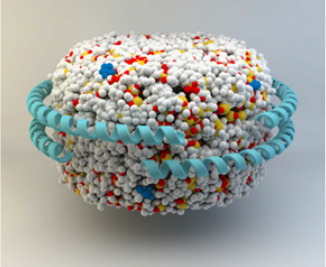CER-001 is a negatively-charged lipoprotein particle which contains human recombinant apoA-I, the natural HDL protein, and two natural phospholipids: sphingomyelin (Sph) and dipalmitoylphosphatidylglycerol (DPPG).
CER-001 mimicks all the structural and functional biological properties of natural, nascent HDL, also known as pre-beta HDL, and has been shown to perform all steps of the Reverse Lipid Transport pathway (RLT), the only natural pathway responsible for lipid elimination.
Administered CER-001 particles increase transient apoA-I and the number of HDL particles, stimulate the removal of excess cholesterol and other lipids from tissues including the arterial wall and become mature HDL particles, support esterification of the trapped cholesterol through the apoA-I highly stereospecific activation of the LCAT enzyme, are recognized by the liver when transformed in mature HDL, leading to the elimination of the transported lipids and cholesterol through a process called Reverse Lipid Transport (RLT); ultimately the empty particles are recycled.
CER-001 has shown strong preclinical and clinical efficacy in mobilizing cholesterol and promoting reverse lipid transport (RLT) leading to rapid atheosclerotic plaque regression.
CER-001’s properties strongly support its potential to reduce the risk of future cardiac events in post-Acute Coronary Syndrome patients (post-ACS patients) and in Familial Primary Hypoalphalipoproteinemia (FPHA, HDL deficiency) patients.
A wide variety of drugs can be embedded in HDL nanoparticles and could increase efficacy compared to available drug delivery technologies and open a new generation of drugs in oncology. TARGET was the first ever performed clinical study testing the potential of labelled HDL to visualize tumors in cancer patients. A number of preclinical studies have already validated the concept, however this study will support the opportunity to treat cancer patients using HDL nanoparticles as a specific drug delivery platform targeting tumors. CER-001 particles associated to Nanodisk® technology have the future potential to serve as carriers of multiple anti-cancer drugs, antigens, interfering RNA (siRNA's), and anti-sense oligonucleotides (ASOs).
 |

